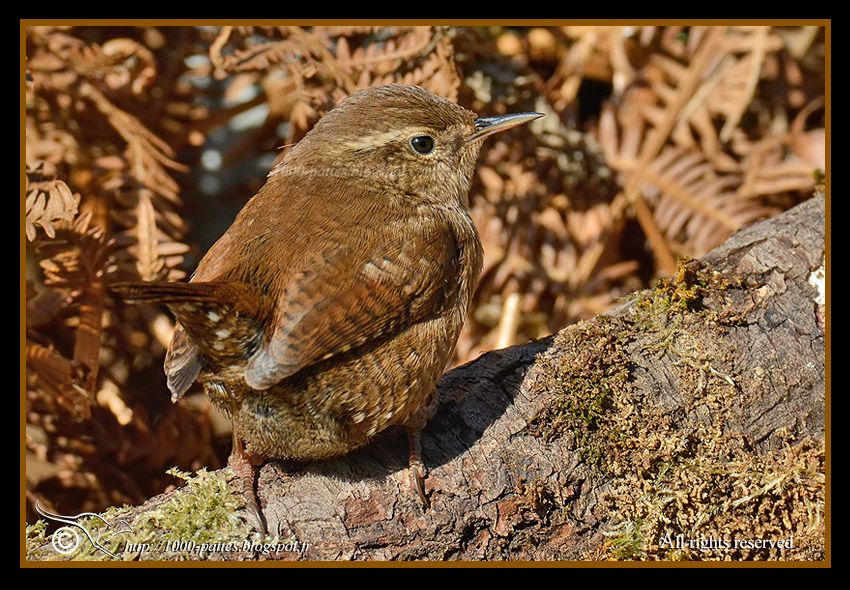Troglodytes troglodytes
Passeriformes - Troglodytidae
Voilà un petit oiseau qui m'a régalée tout au long de l'hiver.
Mâles, femelles et juvéniles ne pouvant se distinguer, je ne peux affirmer qu'il s'agisse toujours du même individu. Quoi qu'il en soit, mon système pour les attirer fonctionne parfaitement, ils ont pris leur aises devant mon objectif et j'ai pu ainsi les observer à loisir dans leur intimité, un vrai jeu de télé-réalité!!!
Il passe beaucoup de temps à sa toilette, à se gratter et à lisser ses plumes et prendre des bains de sable et de soleil... Si-si, vous en verrez la preuve ultérieurement!
Il passe beaucoup de temps à sa toilette, à se gratter et à lisser ses plumes et prendre des bains de sable et de soleil... Si-si, vous en verrez la preuve ultérieurement!
Eurasian wren
This wee-sized bird has delighted me all through winter.
Males, females and juveniles can't be distinguished thus I cant' say if I saw only one or several. However my trick to attract them has worked to perfection they got so comfortable around my feeder I feel it's an open door into their intimacy, a true TV reality-show!
They spend much time preening, scratching, sun and sand bathing... Oh yes, I'll prove it soon!!
Males, females and juveniles can't be distinguished thus I cant' say if I saw only one or several. However my trick to attract them has worked to perfection they got so comfortable around my feeder I feel it's an open door into their intimacy, a true TV reality-show!
They spend much time preening, scratching, sun and sand bathing... Oh yes, I'll prove it soon!!
Ici on le voit se gratter en passant la patte par dessus son aile, comme beacoup d'autres oiseaux:
As many birds, they bring their leg over their wing to scratch (thanks again David!):
















J'adore la dernière !!! Mais toutes ses attitudes sont très sympa !!
RépondreSupprimerBonne journée à toi !!
Bizzz!!
Hi Noushka.
RépondreSupprimerA beautiful bird.
Beautiful pictures you have made of it.
Groettie from Patricia.
What an adorable bird, well, you took it Noushka, of course. Brilliant photos.
RépondreSupprimerJolis portraits du traîne broussaille! J'ai lu la recette pour le faire venir, mais chez nous la fougère est une denrée rare!
RépondreSupprimerSuper pour vous la nouvelle! Nous nous sommes arrêtés plus au nord à Townsville. J'avais repéré Mackay pour voir l'ornithorynque dans Eungella NP, mais j'ai eu la chance de le voir à Atherton!
Il y a vraiment de quoi faire dans la région!
En attendant bonne semaine à vous deux!
With great respect my dear Noushka, may I point out that all birds do not scratch by bringing the leg over the wing. In fact, the scratching method is one of the factors considered in taxonomy. Some birds (e.g. Black-and-white Warbler, Hairy Woodpecker) use both methods. The methods are referred to as direct scratching (under the wing) and indirect scratching (over the wing). Even within families the method is not consistent. For example in 40 species of North American wood warblers, 31 are are indirect scratchers, 7 are direct scratchers. I could go on, but you get the point!
RépondreSupprimerMany thanks for the precision, David, much appreciated!
RépondreSupprimerIt is the case with parrots - my speciality - and with all the birds I observed up to now, I assumed, apparently wrongly, that all the birds were scratching the same way.
Your point is really interesting and I will be watching this with hawk's eyes from now on :)
This is a cute little birdie. That's a fat, juicy worm between its beak.
RépondreSupprimerWonderful shots of this cute, tiny and lousy bird. :-)
RépondreSupprimerGreetings,
JR
So cute, so round, so brown!
RépondreSupprimerBeautiful images from nature, as usual...
Congratulations always, Noushka!!!
big rug and a great week
Bia <°)))<
Dearest Noushka,
RépondreSupprimerMy favorite 'mignon' of a cute little bird.
It looks like if their eyes are embroidered on with feston stitches! Looking forward to your other surprises about these cuties.
Hugs,
Mariette
Dear Noushka,
RépondreSupprimerThese photos of this adorable little bird are gorgeous. I love all the colours, patterns and details of the bird. It makes me want to reach out and hug the little guy. I love your photography. :)
Dear Noushka,
RépondreSupprimerThese photos of this adorable little bird are gorgeous. I love all the colours, patterns and details of the bird. It makes me want to reach out and hug the little guy. I love your photography. :)
Il porte bien son nom et tes photos lui rendent un merveilleux hommage.
RépondreSupprimerMerci
bonn et belle journée
Great serie, lots of detail in the feathers.
RépondreSupprimerGr. John
Bonjour Nouhska,
RépondreSupprimerDifficile de photographier le Troglodyte dans de meilleures conditions et merci d'expliquer ton système pour les attirer. C'est vraiment plaisant de voir avec autant de détails le plumage de ce tout petit oiseau et la couleur des fougères en arrière plan s'accorde parfaitement avec le plumage. Je vois régulièrement le Troglodyte mignon en forêt et son chant est un ravissement pour les oreilles.
Je te souhaite une bonne journée,
Amicalement,
Michel
Tu parles d'une gymnastique pour se gratter !
RépondreSupprimerbon je vais donc mettre des asticots , près de la fougère, mais j'ai peur que les merles n'en fassent leur affaire !
Merci du conseil
bonne fin de soirée
Superbe la petite boule ! Mais quel bec, les insectes et vermisseaux doivent en savoir quelque chose ! Cdlt, M.
RépondreSupprimer